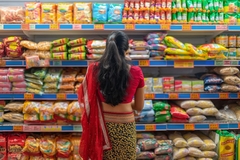
- Industry news
Industry news
- Category news
Category news
- Reports
- Key trends
- Multimedia
- Journal
- Events
- Suppliers
- Home
- Industry news
Industry news
- Category news
Category news
- Reports
- Key trends
- Multimedia
- Events
- Suppliers
EU Commission Proposes to Combine Existing School Milk and Fruit Schemes

31 Jan 2014 --- The European Commission has published a proposal bringing together two currently separate school schemes, the School Fruit Scheme and the School Milk Scheme, under a joint framework. In a context of declining consumption among children for these products, the aim is to address poor nutrition more effectively, to reinforce the educational elements of the programmes and to contribute to fight against obesity.
With the slogan "Eat well - feel good", this enhanced scheme from farm to school will put greater focus on educational measures to improve children's awareness of healthy eating habits, the range of farm produce available, as well as sustainability, environmental and food waste issues.

Commissioner for Agriculture and Rural Development, Dacian Ciolos, said today: "With the changes proposed today, we want to build on the existing schemes, to reverse the downward trend in consumption and raise awareness among children of the potential benefits of these products. This is an important measure for bringing about sustained changes in children's eating habits and improving awareness of important challenges that society faces. I also hope that is will be a great opportunity to strengthen links between the farming community and children, their parents and teachers, especially in urban areas".
The new scheme will operate under a joint legal and financial framework, improving and streamlining the administrative requirements under the two existing schemes. Having this single framework will reduce the management and organisational burden for national authorities, schools and suppliers and make the scheme more efficient. Participation in the scheme will be voluntary for Member States, which will also have flexibility to choose the products they wish to distribute.
As already programmed in last year's deal on future EU spending, the new scheme, once agreed, will have a budget of € 230 million per school year (€150 million for fruit and vegetables and € 80 million for milk). This compares with a budget of €197m (€122m and €75m respectively) in the 2014 budget. The proposal, which will now be submitted to the European Parliament and to the Council, builds on the findings of evaluation reports and the public consultation that was carried out in 2013 in the context of the Impact Assessment process.
The School milk scheme was set up in 1977 and the School fruit scheme in 2009. Both programmes benefit nearly 30 million children every year (over 20 million for the milk scheme and 8,5 million for the school fruit scheme). The need for these schemes seems even more relevant today, in the light of the declining trend in the medium-term F&V and milk consumption and emerging nutrition challenges. In most countries children's consumption of fruits and vegetables is declining and remains below the recommended daily intake. Drinking milk consumption is also declining and children's consumption is shifting towards highly processed products. Overweight and obesity are real concerns: In 2010 the WHO estimated that around 1 in 3 children between 6 and 9 in the EU are overweight or obese. This trend is increasing quickly: estimates for 2008 were 1 in 4.
Dairy UK said the dairy industry welcomed the EU’s new proposed school food scheme but the Commission had seriously misjudged the nutritional benefits of yogurt and cheese.
Dr Judith Bryans, chief executive of Dairy UK, said: “We warmly welcome the EU’s continuing commitment to school milk which has been part of the fabric of Britain for generations.”
“We also recognise the benefits of the new streamlined School Food Scheme which will include milk, fruit and vegetables. However, we strongly believe that the Commission has seriously misjudged the very substantial nutritional benefits that would be delivered to children by the inclusion of yogurt and cheese in the scheme.”
“Although the Commission suggests that this can be addressed at member state level, we believe this omission is a real opportunity missed to give children on a Europe-wide basis the complete range of nutrients that dairy products provide. Milk, cheese and yogurts are all important parts of a healthy diet and parents, teachers and health professionals across the UK recognise this.”
“Dairy UK will be raising the matter with DEFRA as soon as possible and will be working with our colleagues in Europe to address these issues before the proposal goes forward for approval.”










